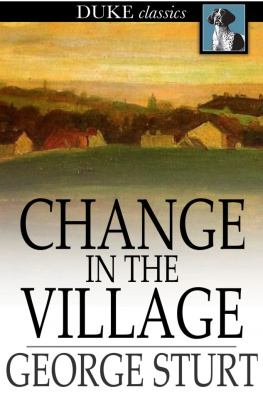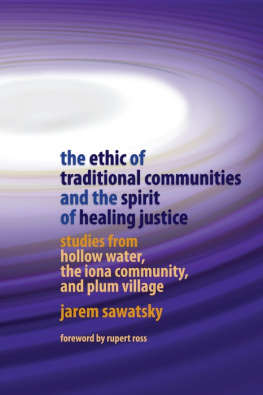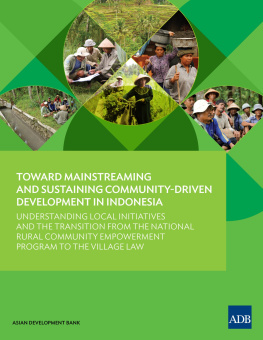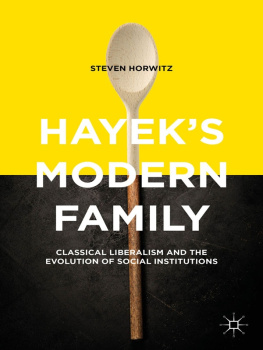The International Library of Sociology
TRADITION AND ECONOMY IN VILLAGE INDIA
The International Library of Sociology
THE SOCIOLOGY OF DEVELOPMENT
In 18 Volumes
| I | Caste and Kinship in Central India | Mayer |
| II | Economics of Development in Village India | Haswell |
| III | Education and Social Change in Ghana | Foster |
| (The above title is not available through Routledge in North America) |
| IV | Growing up in an Egyptian Village | Ammar |
| V | India's Changing Villages | Dube |
| VI | Indian Village | Dube |
| VII | Malay Fishermen | Firth |
| VIII | The Mende of Sierra Leone | Little |
| IX | The Negro Family in British Guiana | Smith |
| X | Peasants in the Pacific | Mayer |
| XI | Population and Society in the Arab East | Baer |
| XII | The Revolution in Anthropology | Jarvie |
| XIII | Settlement Schemes in Tropical Africa | Chambers |
| XIV | Shivapur: A South Indian Village | Ishwaran |
| XV | Social Control in an African Society | Gulliver |
| XVI | State and Economics in the Middle East | Bonne |
| XVII | Tradition and Economy in Village India | Ishwaran |
| XVIII | Transformation Scene | Hogbin |
TRADITION AND ECONOMY IN VILLAGE INDIA
by
K. ISHWARAN
Foreword by
CONRAD ARENSBERG
First published in 1966
by Routledge
Reprinted in 1998, 2001, 2002
by Routledge
2 Park Square, Milton Park, Abingdon, Oxon, OX14 4RN
Transferred to Digital Printing 2007
Routledge is an imprint of the Taylor & Francis Group
1966 K. Ishwaran
All rights reserved. No part of this book may be reprinted or reproduced or utilized in any form or by any electronic, mechanical, or other means, now known or hereafter invented, including photocopying and recording, or in any information storage or retrieval system, without permission in writing from the publishers.
The publishers have made every effort to contact authors/copyright holders of the works reprinted in The International Library of Sociology. This has not been possible in every case, however, and we would welcome correspondence from those individuals/companies we have been unable to trace.
British Library Cataloguing in Publication Data
A CIP catalogue record for this book
is available from the British Library
Tradition and Economy in Village India
ISBN 0-415-17584-4
The Sociology of Development: 18 Volumes
ISBN 0-415-17822-3
The International Library of Sociology: 274 Volumes
ISBN 0-415-17838-X
Publisher's Note
The publisher has gone to great lengths to ensure the quality of this reprint but points out that some imperfections in the original may be apparent
CONTENTS
FOREWORD
THE EFFICACY OF modern village or community studies lies in their deriving better understandings of the structure and function of institutions. They perform this office of social science by analysing the living workings of institutions in the experience of human beings struggling between traditional values and modern imperatives of change. A study of an institution in vivo shows its connections with others and its functions for the social and cultural system of a civilisation as these have evolved in the local and national pasts. Such a study shows no less the self-righting of such systems under the blows of novelty and the lures of the outside world, and thus the adaptation of society and culture to such change. Thus the book before us is a community study, in that it lays bare before us a living village, in an interesting and too little reported region of the great and complex land of India. It is also, most importantly, the study of a local variant of a traditional economic institution, called elsewhere the Jajmani system, better the traditional economy of clientage and patronage, uniting service castes in ritual and craft services to the landowners and cultivators of a corporate village, an object of interest and speculation for social science since its discovery in the seminal historical studies of Sir Henry Maine. But it is most certainly, also, the study of such an institution not only in its setting but also as well in its present role: that of supporting Indian villagers through the travails (and the rewards) of national incorporation and economic revolution. In this, as is the virtue of good community studies and good social science analysis, the study of a purely local scene bears not only upon our current understanding of a nation and a civilisation, but also upon our world-wide concern with a major tide of our age: what Redfield1 called the transformation of peasantry and others more pedestrian entitle the urbanisation of the world.
In good modern world-wide company as it is, this book joins a still more select though ever-growing few. It is done by an Indian national, out of concern for his own land and addressed in part to his fellow nationals. He joins thus a long and honourable tradition of anthropology and sociology marked by earlier names such as Anantha Krishna Iyer and Sarat Chandra Roy and brilliantly continued by those of M. N. Srinivas and S. C. Dube today, to name only a few of the many modern Indians contributing to scholar-ship of importance at once practical and significant both at home and abroad. It is unique, indeed, in that the author, returning to his natal region, does so with the distinction of having already written, as the first to do so, a prior book of well wrought sociological analysis2 by a non-European upon a European scene, thus turning the tables on the many Westerners who have delved for sociological comparisons, not all with the same grace and the same success, in Indian and other non-Western communities.
Professor Ishwaran thus presents us with his sample of Indian civilisation and Kanarese (Mysorean) culture in a single, still vital and viable village. He well attests to its representativeness, not with numbers and statistical proportions, but rather with ethnographically valid identification, description, and elucidation of its still binding values and rules of behaviour, its still continuing social organisation, its still living religious ethos. He shows us how these strands of tradition, these things of the Indian spirit, so well known from literature, piety, and art as well as history, still animate the villagers at home and among themselves, even in a world modernising this village to the extent of its imminent engulfment in a nearby industrialising urban administrative centre and in a nation making good its political integration of the region even to the extent of establishing over the continuing traditional village caste, street, and lineage councils a new local government (the new statutory







